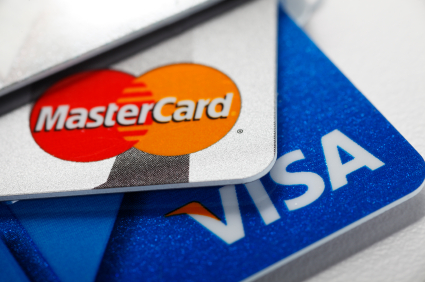What’s the Difference Between Visa and Mastercard?
The rival payment networks administer benefits like rental car insurance, shopping discounts and other perks.
The names Visa and MasterCard are paired nearly as frequently as Minneapolis and St. Paul or Dallas and Fort Worth. But while these major cities are close neighbors, Visa and MasterCard are large payment networks that compete against each other. But to cardholders, Visa and MasterCard sometimes appear to be interchangeable.
Related Article: 5 Things to Do After Bankruptcy
What’s the Difference?
To most credit card users, Visa and MasterCard are just logos that appear in the corner of their card, in addition to that of the card issuer, and possibly a co-branding partner such as an airline, hotel chain or retailer. In the end, the payment network that a card belongs to will have three different effects on cardholders.
First, the payment network will administer benefits on behalf of the card issuer. The card issuer actually chooses which payment network a particular credit card belongs to, based on the benefits that it can offer cardholders, such as rental car insurance, extended warranty coverage and price protection. Nevertheless, the benefits offered by different cards in the same network can vary widely, as card issuers select from a range of benefits when they design a new product. So one Visa card may offer extended warranty protection, while another may not.
In addition, Visa and MasterCard both have premium benefit programs advertised to consumers that offer discounts on shopping as well as savings on travel and other travel perks. Visa offers its Visa Signature program, while MasterCard features its World MasterCard and World Elite MasterCard programs. For example, Visa Signature cardholders can utilize its Visa Signature Luxury Hotel Collection, which features more than 900 luxury hotels where cardholders can receive benefits such as free in-room Internet, room upgrades and complimentary continental breakfast. MasterCard’s World Elite program offers its Luxury Hotels & Resorts program that features similar perks to travelers.
Both Visa and MasterCard’s programs were represented in the winners of the Best Travel Credit Cards in America this year, to give you an idea of how competitive their programs are. Unlike other credit card benefits, customers who have a card that belongs to one of these premium benefit programs can know exactly what is offered, regardless of which bank or credit union issues the card. (You can check out the Best Hotel Rewards Cards in America if you’re interested in getting one of the most rewarding cards.)
In addition, there are some discounts available exclusively to holders of Visa and MasterCard business credit cards. The Visa Savings Edge program is available to Visa business cardholders and it offers savings on common business purchases such as travel, electronics and business solutions. For example, cardholders save 5% on Wyndham group hotels and computer manufacturer Lenovo, and Bing ads from Microsoft. Likewise, the MasterCard Easy Savings program offers similar savings on shipping, office supplies and travel. For instance, this program offers 5% savings on shipping from DHL and Avis car rentals, and 15% from advertisements on Monster.com.
Finally, Visa and MasterCard have slightly different sized payment networks. Visa says it’s accepted at “tens of millions” of merchants and 2.3 million ATMs, in more than 200 countries and territories. MasterCard says its cards are accepted with a similar number of merchants in more than 210 countries and territories. In the end, any difference is likely to come down to each company’s definition of a country or territory, and it’s extremely rare that a merchant will accept one but not the other.
Does It Matter Which One I Choose?
Even though credit card benefits are administered by the payment network, it is up to the credit card issuer to choose which benefits to offer for a particular card. Further, the rates and rewards of each card are also determined by the card issuer, not the payment network. Thus, credit card users will be better off focusing on the terms, benefits and rewards offered by a particular credit card, and not pay much attention to the payment network it belongs to. But once those factors are taken into account, it can make some sense to consider a card’s participation in a premium benefits program such as Visa Signature or World Elite MasterCard, as well as the savings program offered to business cardholders.
When it comes to your credit scores, the issuer of your credit cards is not included in the calculation of your scores, so it’s not a factor at all.
Although very similar, Visa and MasterCard do offer enough distinctions that can sway you to choose one card over another in some situations.





















 Trump & Elon’s SHOCK scheme gets EXPOSED
Trump & Elon’s SHOCK scheme gets EXPOSED



